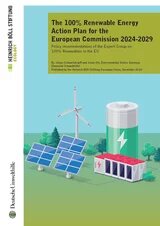The 100% Renewable Energy Action Plan for the European Commission 2024-2029
Read the related web dossier.
A fully renewable energy supply is the most pragmatic way forward in relation to the climate crisis and exploding fossil fuel costs. Europe has an abundant potential of domestic solar energy, wind energy, hydropower, geothermal energy and bioenergy. Switching to these resources will not only lower our energy bill for power, heat and transport. Using our renewable energy sources creates jobs and adds local value in European regions because we will not lose purchase power on importing expensive fossil fuels anymore. This relieves both the environment and public budgets as using renewable energies avoids health and environmental costs caused by fossil fuels and nuclear energy.
The Heinrich-Böll-Stiftung European Union and Environmental Action Germany (Deutsche Umwelthilfe) have convened a group of over 20 experts from academia, industry, civil society and policy-makers from EU institutions to identify the key challenges of the EU’s energy transition. The expert group met five times in 2023 to develop proposals on how to achieve a 100% renewable energy-based EU economy. The result is this 100% Renewable Energy Action Plan for the European Commission 2024-2029, which builds on three key challenges:
- Accelerating renewable energy deployment
- Putting in place the right infrastructure and flexibility for 100% renewables
- Enabling local authorities to manage the transition to 100% renewables
